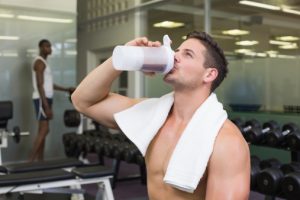 Our body needs protein—that’s a fact. An important building block of bones, muscles, and skin, protein can be found virtually everywhere in the body. Hair and nails, for that matter, are mostly composed of protein. Our body uses it to repair tissues and make enzymes, hormones, and other chemicals that are important for healthy functioning. As you can see, we just can’t do without this all-important macronutrient.
Our body needs protein—that’s a fact. An important building block of bones, muscles, and skin, protein can be found virtually everywhere in the body. Hair and nails, for that matter, are mostly composed of protein. Our body uses it to repair tissues and make enzymes, hormones, and other chemicals that are important for healthy functioning. As you can see, we just can’t do without this all-important macronutrient.
If you pay attention to fitness news or know someone who is seriously into working out and bodybuilding, you’ve surely heard them talk about protein supplements—sipping on their protein shake, munching on a protein bar after training, and buying protein powder jars in bulk. It’s no wonder they are so particular about their protein intake: they need it to grow muscle. (Whatever your age, you can get back the strength to do the things you love doing.)
Advertisement
But you don’t need to be a professional athlete to care about your muscle mass. In fact, this should be one of your concerns as you grow older, as you need more protein to counteract the effects of age-related muscle loss and keep your body strong. As you know, your protein can come from an animal source (meat, fish, dairy, eggs) or plant source (such as soy, cereals, potatoes, and pulses). Even though we usually think of meat and eggs when we talk about protein, 58 percent of protein consumed around the world comes from plants. With the growing popularity of the vegetarian diet, plant protein is becoming more prominent as well. But how does it perform compared to animal protein?
Plant protein vs. animal protein
A recent study published in the American Journal of Clinical Nutrition examined the effects of different plant and animal protein sources on the muscle mass of 3,000 middle-aged participants who were grouped based on their preferred protein source (red meat, chicken, fish, low-fat milk, fast food & dairy, and fruits & vegetables). The analysis uncovered two important things:
1) People with the highest protein intake had the greatest amount of muscle mass.
2) No relationship was found between how much muscle mass the participants had and their preferred source of protein.
Advertisement
The majority of study subjects (80 percent) met or even exceeded their recommended protein intake target, meaning the main impact on their muscles was from protein rather than other food groups. (Scientists have discovered a herb that helps tone your aging muscles and make them strong again.)
Older people often struggle to maintain their muscle mass because they tend to eat less overall when compared to younger people. If this is the case, protein efficiency should be taken into account, as you want to make sure you meet your daily protein needs despite the reduced portions.
Some studies suggest that animal protein may promote a greater muscle-building response in the body. This has to do with its structural properties. Animal protein contains all nine of the essential amino acids and contains more of the one that is considered to be the driver of muscle synthesis (leucine) compared to plant protein. The exceptions are maize protein, which has a leucine content comparable to animal proteins, and quinoa, a superfood boasting the full roster of essential amino acids.
Of course, although animal protein is more efficient, it doesn’t mean you need to turn away from plant sources—far from it. But this knowledge can inform your menu choices depending on the situation. If you are on the go and don’t know when your next meal is going to be, opting for a steak sandwich is a smart decision, as it will keep you full for a lengthy period of time. If your schedule is more predictable, you can eat more plant-sourced protein frequently. Don’t forget to mix different proteins together—diversity is fun and delicious!
